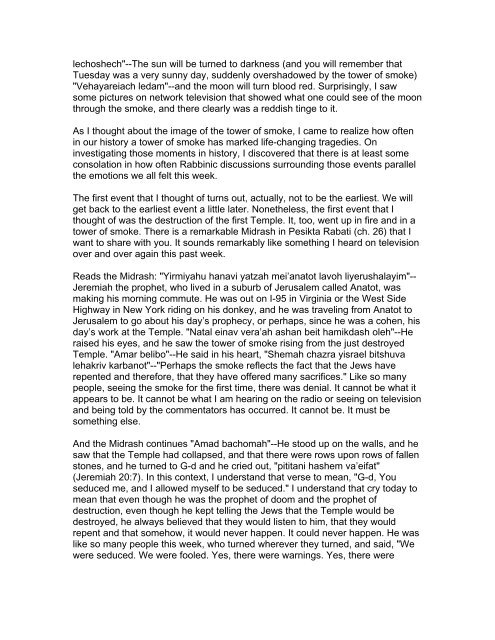You also want an ePaper? Increase the reach of your titles
YUMPU automatically turns print PDFs into web optimized ePapers that Google loves.
lechoshech"--The sun will be turned to darkness (and you will remember thatTuesday was a very sunny day, suddenly overshadowed by the tower <strong>of</strong> smoke)"Vehayareiach ledam"--and the moon will turn blood red. Surprisingly, I sawsome pictures on network television that showed what one could see <strong>of</strong> the moonthrough the smoke, and there clearly was a reddish tinge to it.As I thought about the image <strong>of</strong> the tower <strong>of</strong> smoke, I came to realize how <strong>of</strong>tenin our history a tower <strong>of</strong> smoke has marked life-changing tragedies. Oninvestigating those moments in history, I discovered that there is at least someconsolation in how <strong>of</strong>ten Rabbinic discussions surrounding those events parallelthe emotions we all felt this week.The first event that I thought <strong>of</strong> turns out, actually, not to be the earliest. We willget back to the earliest event a little later. Nonetheless, the first event that Ithought <strong>of</strong> was the destruction <strong>of</strong> the first Temple. It, too, went up in fire and in atower <strong>of</strong> smoke. There is a remarkable Midrash in Pesikta Rabati (ch. 26) that Iwant to share with you. It sounds remarkably like something I heard on televisionover and over again this past week.Reads the Midrash: "Yirmiyahu hanavi yatzah mei’anatot lavoh liyerushalayim"--Jeremiah the prophet, who lived in a suburb <strong>of</strong> Jerusalem called Anatot, wasmaking his morning commute. He was out on I-95 in Virginia or the West SideHighway in New York riding on his donkey, and he was traveling from Anatot toJerusalem to go about his day’s prophecy, or perhaps, since he was a cohen, hisday’s work at the Temple. "Natal einav vera’ah ashan beit hamikdash oleh"--Heraised his eyes, and he saw the tower <strong>of</strong> smoke rising from the just destroyedTemple. "Amar belibo"--He said in his heart, "Shemah chazra yisrael bitshuvalehakriv karbanot"--"Perhaps the smoke reflects the fact that the Jews haverepented and therefore, that they have <strong>of</strong>fered many sacrifices." Like so manypeople, seeing the smoke for the first time, there was denial. It cannot be what itappears to be. It cannot be what I am hearing on the radio or seeing on televisionand being told by the commentators has occurred. It cannot be. It must besomething else.And the Midrash continues "Amad bachomah"--He stood up on the walls, and hesaw that the Temple had collapsed, and that there were rows upon rows <strong>of</strong> fallenstones, and he turned to G-d and he cried out, "pititani hashem va’eifat"(Jeremiah 20:7). In this context, I understand that verse to mean, "G-d, Youseduced me, and I allowed myself to be seduced." I understand that cry today tomean that even though he was the prophet <strong>of</strong> doom and the prophet <strong>of</strong>destruction, even though he kept telling the Jews that the Temple would bedestroyed, he always believed that they would listen to him, that they wouldrepent and that somehow, it would never happen. It could never happen. He waslike so many people this week, who turned wherever they turned, and said, "Wewere seduced. We were fooled. Yes, there were warnings. Yes, there were


